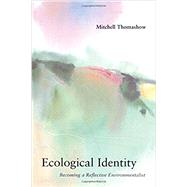Ecological Identity Becoming a Reflective Environmentalist
, by Thomashow, Mitchell- ISBN: 9780262700634 | 0262700638
- Cover: Paperback
- Copyright: 7/25/1996
Mitchell Thomashow, a preeminent educator, shows how environmental studies can be taught from different perspective, one that is deeply informed by personal reflection. Through theoretical discussion as well as hands-on participatory learning approaches, Thomashow provides concerned citizens, teachers, and students with the tools needed to become reflective environmentalists. What do I know about the place where I live? Where do things come from? How do I connect to the earth? What is my purpose as a human being? These are the questions that Thomashow identifies as being at the heart of environmental education. Developing a profound sense of oneself in relationship to natural and social ecosystems is necessary grounding for the difficult work of environmental advocacy. In this book he provides a clear and accessible guide to the learning experiences that accompany the construction of an "ecological identity": using the direct experience of nature as a framework for personal decisions, professional choices, political action, and spiritual inquiry. Ecological Identitycovers the different types of environmental thought and activism (using John Muir, Henry David Thoreau, and Rachel Carson as environmental archetypes, but branching out into ecofeminism and bioregionalism), issues of personal property and consumption, political identity and citizenship, and integrating ecological identity work into environmental studies programs. Each chapter has accompanying learning activities such as the Sense of Place Map, a Community Network Map, and the Political Genogram, most of which can be carried out on an individual basis. Although people from diverse backgrounds become environmental activists and enroll in environmental studies programs, they are rarely encouraged to examine their own history, motivations, and aspirations. Thomashow's approach is to reveal the depth of personal experience that underlies contemporary environmentalism and to explore, interpret, and nurture the learning spaces made possible when people are moved to contemplate their experience of nature.







